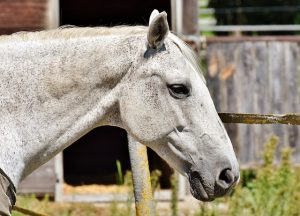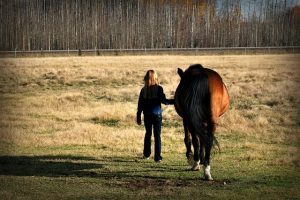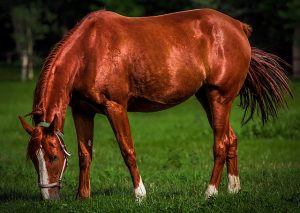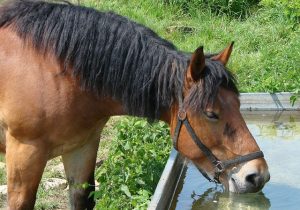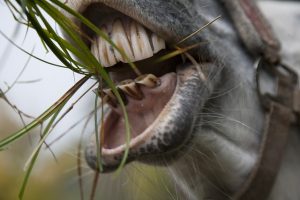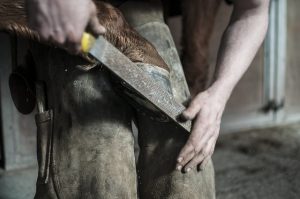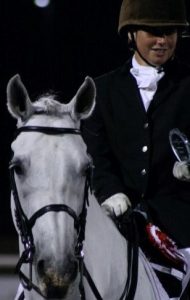Many older horses are living lives that are longer and that have a higher-quality due to improved equine nutrition, parasite control, veterinary care, and alternative therapies. (See our previous two articles about equine alternative therapies here and here!)
In many equestrian disciplines today, horses often don’t reach their peak until their teenage years. The equine “golden years” are considered to start between the ages of 18 and 20 but, like humans, some horses maintain an excellent body condition and continue to be full of energy, whereas others deteriorate quickly.
To keep your older horse in good shape, it is vital that he has a program that includes sufficient exercise, correct feeding, regular deworming, and vaccinations. He should also receive regular check-ups from both your veterinarian and your equine dentist.
Aging Process
Horses over the age of 15 are considered seniors by equine insurance companies. Premiums are higher as older horses are more prone to illness and injuries.
The aging process affects the veteran horse in many ways:
- Loss of ability to absorb nutrients adequately
- Loss of muscle tone
- Weight loss or weight gain
- Weakening of bones and joints
- Stiffness
- Increased dental problems
- Immune system less efficient
- Issues in regulating body temperature
- Grey hair around eyes and muzzle
- Grey horses become whiter and speckled
- Depression over eye becomes more hollowed
Weight Issues
Older horses have trouble either keeping weight on or keeping it off
The Thin Horse
Reasons that your veteran is losing weight can include:
- Not enough food
- Dental problems
- Competing with others in the herd for food
- Worms
- Picky eater
- Progressive stage of Cushing’s disease
An older horse that is not receiving enough feed or has an unbalanced diet is prone to infections or anemia and it is also likely that they will feel the cold more during winter.
To add calories, use a high-fat supplement (such as vegetable oil) along with soaked sugar beet pellets. A cup of oil can be given twice a day in the feed, but remember to introduce it gradually.
Ensure that his teeth are checked regularly and have a worming program in place.
Monitor your veteran if he is out in the paddock with a herd as senior horses tend to have a lower rank and can be easily bullied. It may be better to bring your horse inside for feeding, or feed in a separate paddock.
Consult your veterinarian if your horse still doesn’t gain weight, or you have any other concerns.
The Overweight Horse
Reasons your older horse may be overweight include:
- Too much feed
- Lack of exercise
- Metabolic disease or early stage of Cushing’s disease
- Hormonal or insulin disorders
If your veteran is overweight, you need to be very careful as it can lead to laminitis. It also puts an extra strain on the joints. Make sure your horse receives regular exercise and a proper diet.
If your horse doesn’t lose weight, consult your veterinarian who can investigate further.
What To Feed
Older horses require a higher amount of protein, at least 12-14%, and between 7-10% of fat. They need feeds that are easy to chew and highly digestible along with the best quality hay. Hay cubes provide a good dust-free alternative.
There are many commercial feeds available, designed for the needs of the aging horse. However, if your senior maintains a good body condition and good health on regular feeds, there is no reason to change unless you begin to notice a difference in him.
Giving a vitamin and mineral supplement helps your veteran to metabolize fats, proteins, and carbohydrates, and Omega 3 oils help prevent arthritis and laminitis.
Horses with worn down or missing teeth need their feed pellets and hay cubes soaked to create a mash to help prevent choking. The water also helps to maintain intestinal function. Soaked sugar beet pulp is also an excellent addition to the feed.
However, each horse is different and has its own unique nutritional needs. If you are not sure what to feed, discuss with your veterinarian or an equine nutritionist who can recommend a suitable diet for your veteran’s age and condition and any disorders they may have.
Drinking Water
To ensure that your horse drinks enough and doesn’t become dehydrated, provide loose salt along with a salt block to encourage him to drink water.
In winter, your veteran should be given warm water as he is unlikely to drink icy water.
Observe your veteran’s drinking habits. Drinking water excessively could indicate that something is wrong so consult your veterinarian for an appointment.
Worming and Vaccinations
As your horse starts to age, his immune system becomes less efficient, leaving him more prone to disease and reduced resistance to parasites.
Make sure your veteran’s vaccinations are kept up-to-date and have a regular worming program in place. Schedule a twice-yearly fecal egg count to ensure your program is effective.
Teeth
Owners are very aware these days of the importance of having their horse’s teeth checked regularly, particularly in older horses.
As the horse ages, his teeth wear down at various lengths or even begin to fall out. They can also develop diastema, where there are gaps in between the teeth can become packed with feed, causing painful gum disease.
Your horse may also have sharp edges or hooks in his teeth that cause discomfort to him.
If you notice balls of feed (‘quids’) dropping out your horse’s mouth, he may have difficulty in chewing. Also check your horse’s droppings for poorly digested food particles.
Other signs to watch out for are bad breath, “playing” with the water but not drinking, or jerking his head away from water. Your horse risks choking, colic, diarrhea, and weight loss if he doesn’t chew his feed properly.
Have an equine dentist check your horse twice a year. If you notice problems in between, schedule the dentist to come before the next check-up is due.
Veterinary Wellness Check
Your veterinarian should perform a thorough examination on your veteran at least once a year, checking his weight and body condition score, soundness test, and an assessment of any dental needs.
Your veterinarian will also take blood samples to check for problems such as infection, insulin resistance, or Cushing’s disease. Any findings in the results may mean that your horse requires medication and a special diet along with correct management.
Common conditions in senior horses include:
Cushing’s Disease
This disease is a malfunction of the horse’s pituitary gland.
Signs include:
- Long, curly coat
- Increased thirst and urination
- Muscle wastage
- Tiredness
- Fat deposits around neck and above eyes
- Abnormal sweating
- Prone to infection
- Laminitis
The condition is incurable, but it can, however, be controlled by the appropriate medication, clipping the coat, weight control, regular dental checks, and correct feeding.
Arthritis
Arthritis is widespread in older horses and it affects the joints.
The signs are:
- Swelling around joints
- Lameness
- Stiffness
- Reluctance to move forwards
Contact your veterinarian if your horse shows any of the symptoms described so they can examine him by carrying out flexion tests and x-rays.
Arthritis can be managed by anti-inflammatory drugs and by giving a joint supplement. Your horse should be turned out and exercised when possible.
The Horse’s Feet
It is important that your veteran has his feet trimmed regularly as his hooves are less likely to crack, reducing the chances of abscesses and other lameness issues. Good hoof balance encourages even weight-bearing and places less strain on the joints.
Exercise
Exercising your veteran improves his appetite, digestion, and muscle tone, and is also good for his mental health. However, it all depends on your horse’s abilities.
When exercising your veteran, don’t overdo it as he will tend to tire more quickly than a younger horse. At the beginning of your ride, walk him for at least ten minutes, giving him the chance to loosen up. Allow him time at the end of the session as well to stretch and cool down.
Older horses overheat easily, so, on hot days, ride him early in the morning or late evening, or not at all if it is boiling.
Have the fit of your saddle checked regularly by a qualified saddle fitter as your veteran’s body shape will change. A saddle with an adjustable gullet is ideal.
If it is not possible to ride your horse, then he should be hand-walked and go out in the paddock as much as possible. Ensure that he has appropriate shade, and in the winter, make sure he is warm enough, putting a rug on if he is thin or appears cold.
Final Thoughts
By managing your older horse correctly, he can enjoy a decent quality of life. Monitor his condition regularly and pay attention to any changes in his behavior and habits, seeking veterinary advice when necessary.
Alison O’Callaghan, our Equine Editor, is a professional horse riding instructor and has owned many types of pets. When she is not riding horses or walking her dog, she loves to write about animals. If you’d like to contact Alison, you can email her at ocallaghan462@gmail.com.

